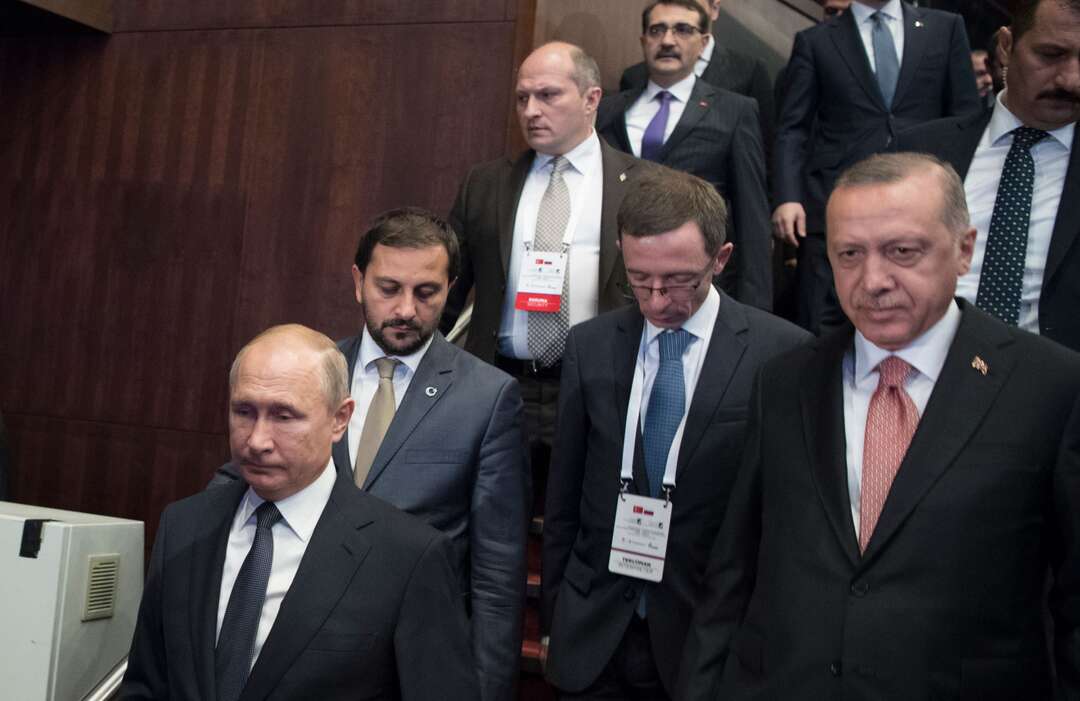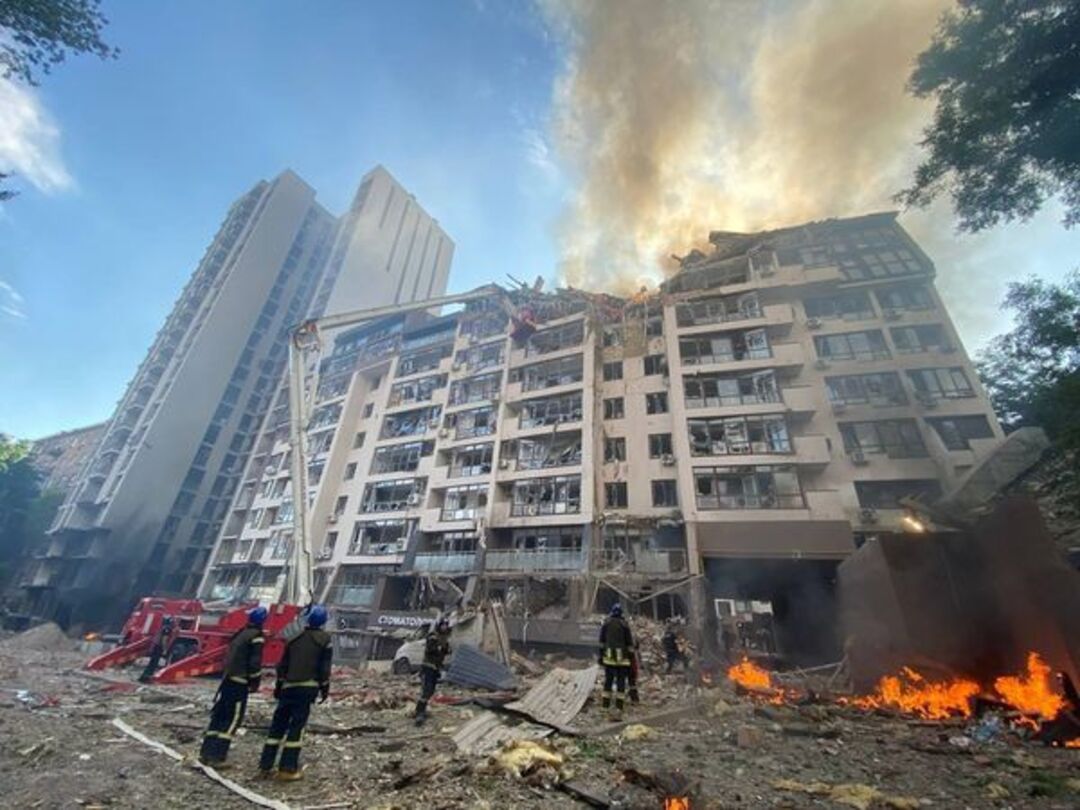-
Erdogan Meets Putin in Sochi to Push Syria Operation

Russian President Vladimir Putin hosts his Turkish counterpart, Recep Tayyip Erdogan, today (Friday August 5) in the Russian resort town of Sochi, with the two leaders set to discuss military invasions—both potential and ongoing, the Foreign Policy reported.
Putin and Erdogan last met less than three weeks ago in the Iranian capital, Tehran. Despite their differences over the war in Ukraine - Ankara is a major arms supplier to Kyiv - their countries have made diplomatic strides.
The two men have good reasons to keep up a good working relationship. For Putin, Erdogan serves as a reliable spoiler on NATO policy as well as a willing customer for Russian gas, the Foreign Policy said.
For Erdogan, Putin helps showcase Turkey’s independent foreign policy as well as keep the lights on at home: Russia supplies 45 percent of Turkey’s gas, and Russia’s Rosatom is constructing a nuclear plant on Turkey’s Mediterranean coast, which is expected to power 10 percent of the country’s domestic energy needs when fully operational.
Today’s talks are expected to continue a topic pursued in Tehran: Turkey’s impending invasion of Syria. In an echo of Moscow’s description of its war in Ukraine, Ankara describes the incursion as a “special military operation.”

Erdogan has stated his desire to establish a 30-kilometer [19-mile] deep “security zone” that extends from the Turkish border into Syrian territory and one that is likely to come dangerously close to Russian, Syrian, and Iran-backed forces.
Today’s meeting can be seen as another attempt by Erdogan to deconflict with a major military power before going all in.
Vladimir Putin heads to Tehran for talks with leaders of Iran and Turkey
“Erdogan really wants to get his ducks in a row so he can launch a further operation in northern Syria, and he really needs to make sure that there’s no risk of Russia intervening in direct opposition to Turkish forces,” Howard Eissenstat, a Turkey expert at St. Lawrence University and the Middle East Institute, told Foreign Policy.
There’s an obvious electoral benefit for Erdogan in stirring up nationalism before an election, but there’s more at stake than optics, Eissenstat said.
“There’s a profound sense from the national security establishment that the YPG needs to be ended, in particular because of its relationship with the U.S., and as a political determination on the part of the AKP to appear to be doing something with regard to refugees,” he said.
Erdogan's "Safe Zone" as an umbrella for terrorists and jihadi outfit
The United States, which considers the YPG a key partner in its war against the Islamic State in Syria, has repeatedly cautioned against the incursion. But, Eissenstat said—despite the leverage Washington has over Turkey in terms of military sales and economic might—the decision might be one the White House is unwilling to make given the many sensitive diplomatic issues at play.
Eissenstat cautioned against underestimating Ankara’s will, no matter what Washington thinks. “I think that we often assume that the biggest kid in the room gets to decide who gets the cookies, but sometimes it’s who’s closest—and who wants it more.”
Source: foreignpolicy
You May Also Like
Popular Posts
Caricature
BENEFIT Sponsors BuildHer...
- April 23, 2025
BENEFIT, the Kingdom’s innovator and leading company in Fintech and electronic financial transactions service, has sponsored the BuildHer CityHack 2025 Hackathon, a two-day event spearheaded by the College of Engineering and Technology at the Royal University for Women (RUW).
Aimed at secondary school students, the event brought together a distinguished group of academic professionals and technology experts to mentor and inspire young participants.
More than 100 high school students from across the Kingdom of Bahrain took part in the hackathon, which featured an intensive programme of training workshops and hands-on sessions. These activities were tailored to enhance participants’ critical thinking, collaborative problem-solving, and team-building capabilities, while also encouraging the development of practical and sustainable solutions to contemporary challenges using modern technological tools.
BENEFIT’s Chief Executive Mr. Abdulwahed AlJanahi, commented: “Our support for this educational hackathon reflects our long-term strategic vision to nurture the talents of emerging national youth and empower the next generation of accomplished female leaders in technology. By fostering creativity and innovation, we aim to contribute meaningfully to Bahrain’s comprehensive development goals and align with the aspirations outlined in the Kingdom’s Vision 2030—an ambition in which BENEFIT plays a central role.”
Professor Riyadh Yousif Hamzah, President of the Royal University for Women, commented: “This initiative reflects our commitment to advancing women in STEM fields. We're cultivating a generation of creative, solution-driven female leaders who will drive national development. Our partnership with BENEFIT exemplifies the powerful synergy between academia and private sector in supporting educational innovation.”
Hanan Abdulla Hasan, Senior Manager, PR & Communication at BENEFIT, said: “We are honoured to collaborate with RUW in supporting this remarkable technology-focused event. It highlights our commitment to social responsibility, and our ongoing efforts to enhance the digital and innovation capabilities of young Bahraini women and foster their ability to harness technological tools in the service of a smarter, more sustainable future.”
For his part, Dr. Humam ElAgha, Acting Dean of the College of Engineering and Technology at the University, said: “BuildHer CityHack 2025 embodies our hands-on approach to education. By tackling real-world problems through creative thinking and sustainable solutions, we're preparing women to thrive in the knowledge economy – a cornerstone of the University's vision.”
opinion
Report
ads
Newsletter
Subscribe to our mailing list to get the new updates!






















